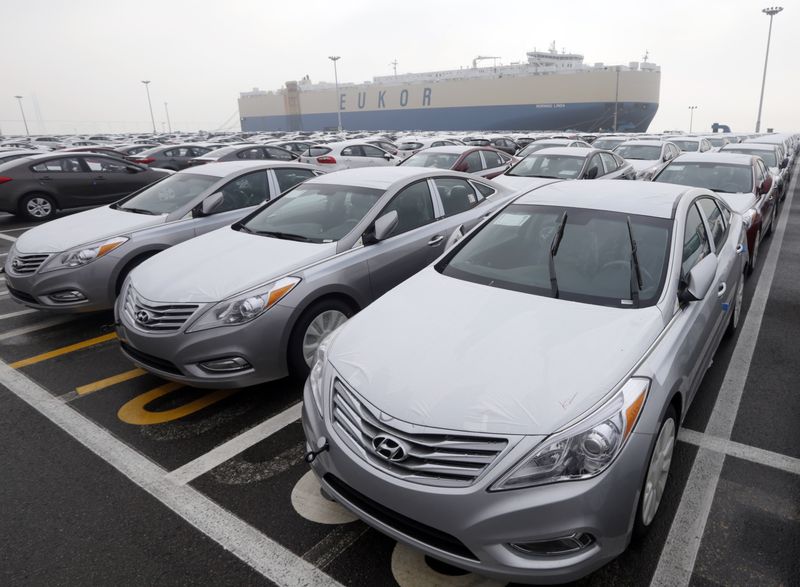
© Reuters. FILE PHOTO: Hyundai Motor sedans are parked at a shipping yard of South Korea’s biggest automakers Hyundai Motor Co and affiliate Kia Motors Corp at a port in Pyeongtaek, about 70 km (43 miles) south of Seoul January 22, 2013. REUTERS/Lee Jae-Won
2/2
By Byungwook Kim and Heekyong Yang
ULSAN, South Korea (Reuters) – Defiant South Korean truckers embarked on broader and more aggressive strike action on Friday, threatening to severely curtail deliveries of raw materials for semiconductors and petrochemical products.
Entering its fourth day, the strike protesting soaring fuel costs halved production at Hyundai Motor Co’s biggest factory complex on Thursday and has disrupted shipments for a range of companies including steelmaking giant POSCO (NYSE:).
Container traffic at ports has also slowed sharply. At Busan port, which accounts for 80% of the country’s container activity, traffic was down to a third of normal levels on Friday, a government official said.
At Incheon port, it has fallen to 20% of normal levels while at the port for Ulsan, the industrial hub where much of the strike action has occurred, container traffic has been completely suspended since Tuesday.
Some 7,500 members, or about 35% of the Cargo Truckers Solidarity union, are expected to be on strike on Friday, the transport ministry said. The government estimates that about 6% of the country’s 420,000 truck drivers belong to a union.
The union has contended that the numbers on strike are much higher than government estimates and that many non-union truckers are also refusing to work.
South Korea is a major supplier of semiconductors, smartphones, autos, batteries and electronics goods and the latest industrial action further raises uncertainty over global supply chains already disrupted by China’s strict COVID restrictions and Russia’s invasion of Ukraine.
Faced with one of his first big economic challenges, new President Yoon Suk-yeol has taken what he calls a neutral stance, saying the government should not be involved too much.
That has alarmed some observers, who say Yoon’s remarks could hinder the government’s ability to come up with a solution.
“The government needs to review the union’s demands. They don’t need to accept them all, but I think they could make the situation a bit easier if they could consider giving out subsidies so truckers can deal with soaring fuel prices,” said Shin Se-don, an economics professor at Sookmyung Women’s University.
The union said a meeting with the government on Friday ended without an agreement and they would meet again on Saturday.
HYUNDAI HINDERED
Share prices of major companies have been little affected on the view that the firms have sufficient inventories to ride out the strike for the time being.
Kim Gyeong-dong, a trucker union official, said the union ran out of funds to finance the strike on Thursday and that it was unlikely that the strike could last another 10 days.
Some companies were looking to make new contingency plans.
“If the strike continues next week, then we need to reassess our handling of shipments,” said an official at a major South Korean electric vehicle (EV) battery maker, declining to be identified due to the sensitivity of the subject.
Outside factory and ports, union members were not physically blocking gates but would flag down approaching vehicles driven by non-union truckers, asking them not to proceed and cooperate with the strike. Police were present, however, and trucks wanting to be let through would not be stopped.
Among new actions, truckers plan to stop shipments of raw materials for semiconductors that are produced in Ulsan, Park Jeong-tae, a senior truckers union official, told Reuters on Friday.
Chipmakers Samsung Electronics (OTC:) Co and SK Hynix declined to comment.
Park added union efforts had cut the number of vehicles entering a big Ulsan petrochemical complex to one-tenth of normal levels and that it was planning similar stringent strike action at other petrochemical complexes across the country.
Some 1,000 truckers were protesting outside Hyundai Motor’s main complex in Ulsan on Friday, a Reuters witness reported.
“There are some disruptions to our production due to the truckers strike, and we hope production would be normalised as soon as possible,” a Hyundai spokesperson said.
Hyundai normally makes about 6,000 vehicles a day at its plants in Ulsan.
The truckers, regarded as self-employed contractors in South Korea, are seeking pay increases and a pledge that an emergency measure guaranteeing freight rates would be extended. The emergency measure was introduced during the pandemic and is due to expire in December.
Police said around 30 union members have been arrested so far.
Stay connected with us on social media platform for instant update click here to join our Twitter, & Facebook
We are now on Telegram. Click here to join our channel (@TechiUpdate) and stay updated with the latest Technology headlines.
For all the latest Business News Click Here
For the latest news and updates, follow us on Google News.
